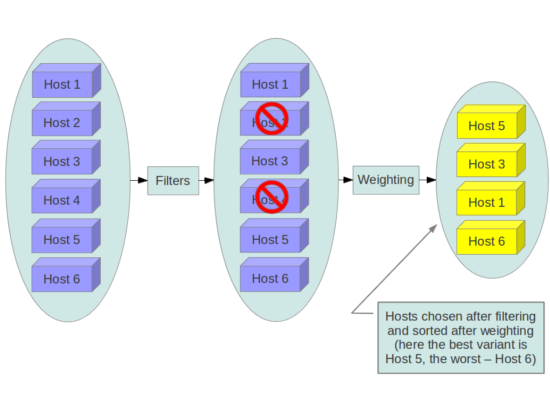Nova scheduler
Nova部署、迁移VM都会用到scheduler来调度。本文内容基于Icehouse。
#Filters and Weights

Filters会过滤不符合条件的宿主机,然后经过Weights获得权重,最终选择权重最大的host。
常用filter有RetryFilter,AvailabilityZoneFilter,RamFilter,ComputeFilter,ComputeCapabilitiesFilter,ImagePropertiesFilter。
默认启用的weighter只有RAMWeigher。。会返回host的可用内存,最终选取可用内存最大的host。
另外还有个MetricsWeigher,可以自定义各项metric的重要性,不过默认没有启用。
#Resource tracker
那么这些权重怎么获取呢?
nova/compute/manager.py 有个periodic task update_available_resource,每分钟会更新一次host的资源使用情况。最终会调用到resource tracker里的_sync compute node,更新compute_nodes表。scheduler里的HostManager再从数据库里获取metrics。
scheduler本身不会更新host metric,只会在filter_scheduler _provision_resource时更新instance的host, node及schedule_at。
#是否有cache 没有,有个caching scheduler,可缓存all_host_states,默认没有启用。
#retry如何实现?
filter scheduler -> def scheduler_run_instance -> def _schedule -> def _populate_retry
retry = {
'num_attempts': 1,
'hosts': [] # list of compute hosts tried
}
filter_properties['retry'] = retry
compute/manager.py有_reschedule_or_error,如果失败会RPC调用scheduler。 另外有个RetryFilter,会过滤之前尝试(失败)过的host。
相关资料:
Mirantis: Nova Scheduler-Database Interactions: How to Nail Those Scalability Thwarters
Update:
最后补充个用 pyreverse 画的类图
comments powered by Disqus